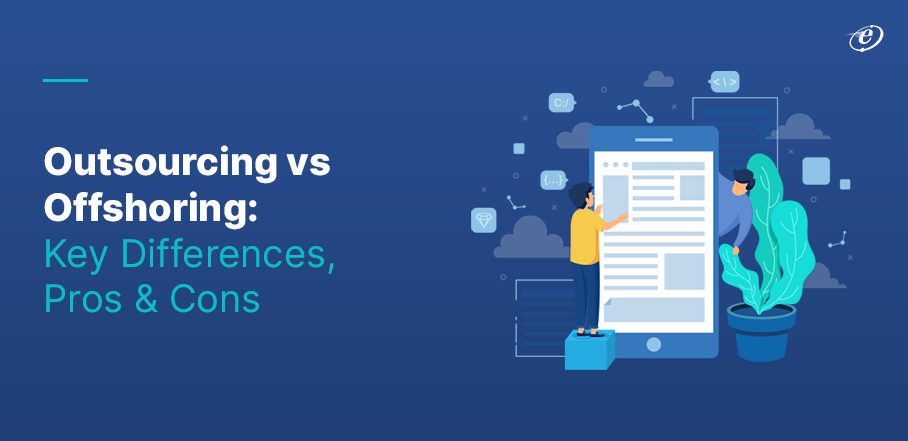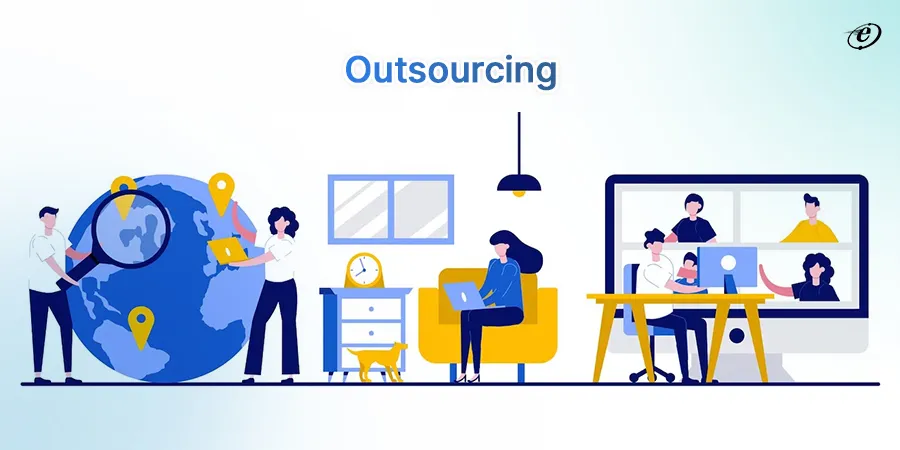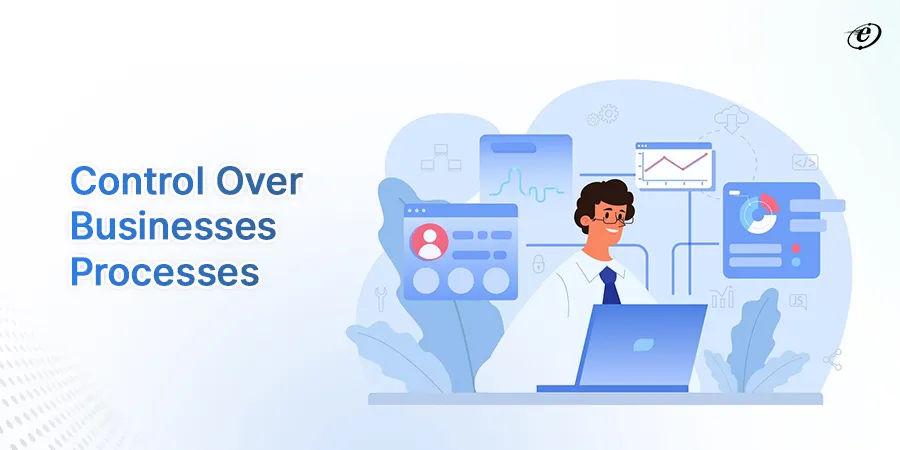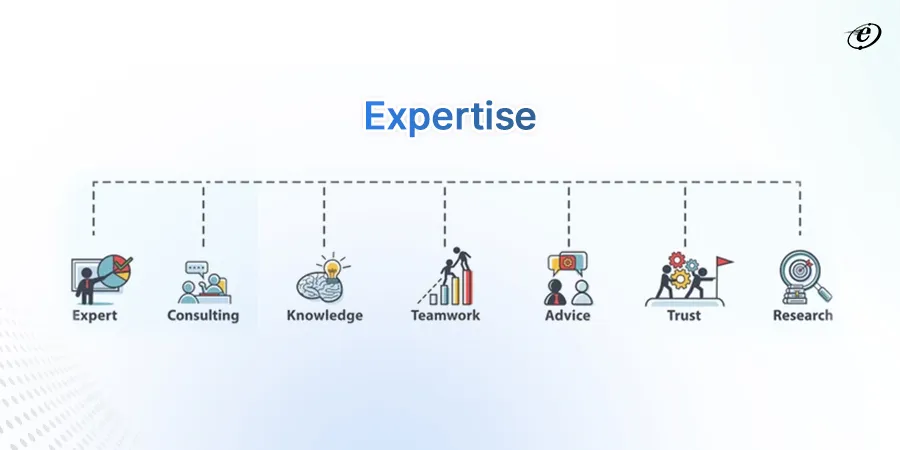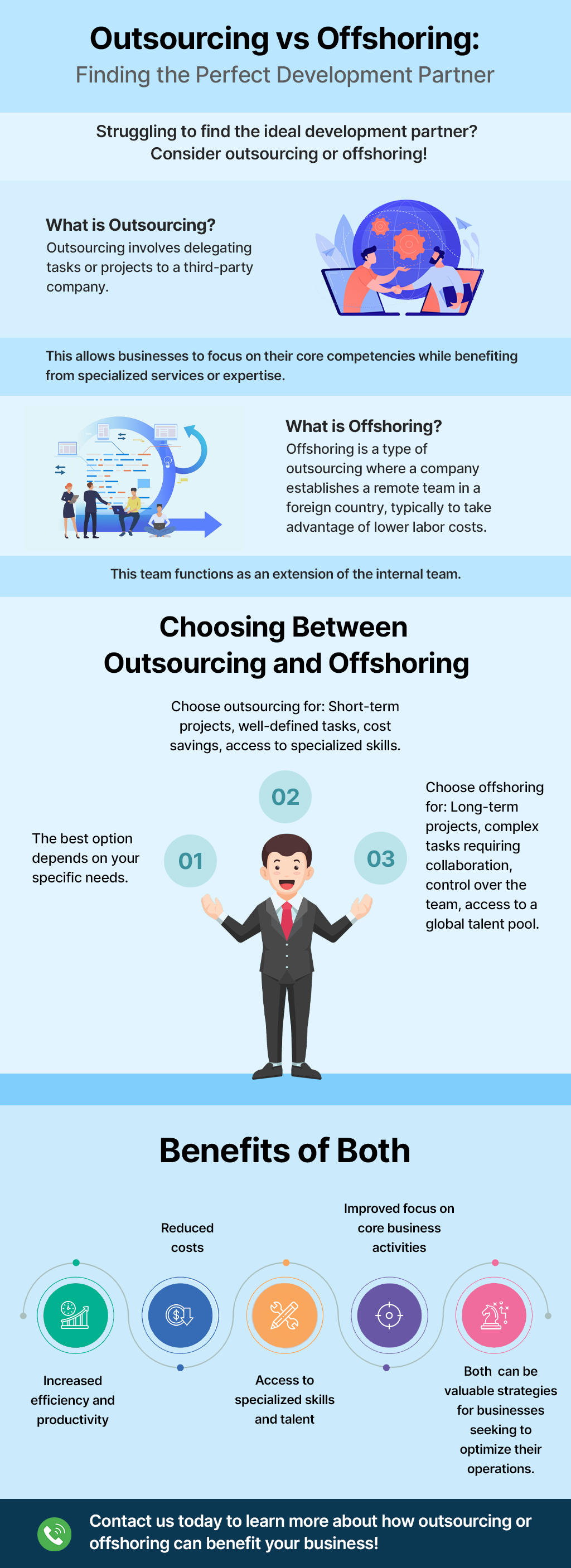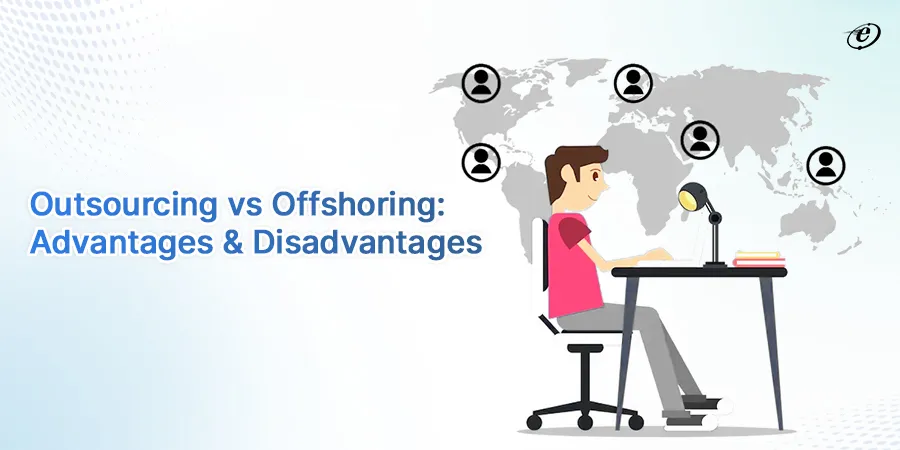Finding the ideal development partner can be challenging if you have a limited budget and you want development faster. In this situation, the best course of action is outsourcing and offshoring. Today in this blog, we will put light on outsourcing vs offshoring to help you understand which is best for your business needs.
Outsource vs offshore are two models used in modern organizations. As company margins have shrunk and businesses have turned to them to save costs and improve efficiency, they have emerged as a game-changer in the modern era.
Offshoring and outsourcing are two phrases that are frequently conflated or misunderstood in the IT industry. Although there is some overlap between the two, they are different business strategies with unique pros and cons.
When a corporation outsources its job, it assigns the task to the external organization on a contractual basis while concentrating on its main business operations. On the other hand, offshore is a form of outsourcing in which a company process or service is moved or transferred to a foreign nation to benefit from lower costs.
Outsourcing vs offshoring is comparable because both involve sending teams from outside your local company’s facilities to carry out specific business tasks. Another similarity is that the use of both models is frequently motivated by cost-effectiveness and overall productivity.
Offshoring and outsourcing both seek to enhance business operations. To obtain a competitive advantage, multinational enterprises and SMBs look to implement either strategy or a combination of the two.
If you are one of those looking for ways to enhance the profitability & productivity of your business, in that case, understanding the concept of outsource vs offshore is essential to figure out- Do the two differ from one another? If so, which one is ideal for your specific needs?
Let’s dive deep into outsourcing vs offshoring.
Outsourcing vs Offshoring- Let’s learn the basics
What is Outsourcing?
Delegating a portion of business operations or processes to a third party is known as outsourcing. Outsourcing is contracting with a third-party company rather than handling these tasks internally. Companies usually outsource non-essential tasks or jobs to concentrate on their primary obligations and increase internal efficiency. Customer service, IT administration, accounting, and marketing are a few business functions that are frequently outsourced. The majority of procedures that are outsourced focus on ancillary, non-essential tasks.
Professional outsourcing companies can efficiently manage repetitive, tedious, time-consuming, and specific innovative jobs. In addition to increasing your profit margin, you’ll be able to execute several jobs far more quickly than your internal workforce could. Just be clear about all of your expectations up front while searching for the best outsourcing companies,to prevent any misunderstandings later.
There are various benefits of outsourcing software development in India, including less cost, a vast IT talent pool, easy onboarding policies, etc. According to Statista, at the end of 2023, India’s total IT Outsourcing revenue will be US$7.81 billion. By 2027, the market is projected to reach a value of US$12.47 billion with a revenue growth rate (CAGR 2023–2027) of 12.42% per year.
What is the best example of outsourcing?
Outsourcing is the transfer of internal operations to a third party. This can take the form of moving an entire business division to a third party and then purchasing the service, for example, selling a physical plant to a supplier. The fundamental tenet is to delegate transactional tasks to professionals so that a business can concentrate on its area of competence.
Another illustration would be a business that decides to employ a ready-made software package but hires a consultant to assist them in customizing it for their particular requirements.
Read the complete guide on how to outsource web development.
What is Offshoring?
Offshoring is the process of moving a company’s operations to a location outside of its home country where it can access resources more cheaply, ultimately lowering overall costs. An offshore staff will uphold your standards as an extension of your onshore team. They can be managed in the same manner as your internal teams. Typically, this entails appointing a specialist project manager as the main point of contact and overseeing all work.
In contrast to outsourcing, an offshore software development company frequently provide essential duties to an internal workforce that works remotely. Offshoring enables businesses to profit from tax advantages while reducing labor and resource costs.
According to Statista, in 2021, India was rated as the most desirable location for offshore business services due to its financial attractiveness, staff availability, and talent.
Read more on how to setup an offshore development center in India.
What is the best example of offshoring?
Offshoring gives your internal staff the ability to concentrate on the issues that are most important to your company at that particular moment. Before WhatsApp was introduced in 2009, the business outsourced the development of its software to Eastern Europe. While their in-house engineers were focused on client-related responsibilities, such as customer assistance, WhatsApp relied on offshore expertise for backstage management, design solutions, and core app development.
Key Differences Between Outsourcing vs Offshoring
Here are some crucial points you should consider when deciding whether to offshore or outsource your business’s needs to receive the best value for your company’s expansion and success.
-
Work Quality
Out of outsourcing vs offshoring outsourcing may impact the quality of the work because the team members you hire are not devoted employees of your firm. Moreover, they could also have projects other than yours, which could affect the timeline for your production.
While Offshore team members are considered regular employees of your company. Just like your in-house team, your offshore staff are also required to uphold your company’s standards, policies, and processes. Since they are dedicated to working on your company’s tasks, only it is expected that they are focused only on your work. This will ensure consistency in terms of delivering high-quality output.
-
Flexibility & Scalability
When business progresses, you need to scale up or down the workforce. Being responsive to new opportunities or swiftly shifting market conditions is another flexibility aspect. Generally, companies prefer to outsource vs offshore model- they outsource when there is a talent gap in the current team and offshore when struggling with flexibility and scalability.
With the capacity to “stretch up and down” workers as necessary throughout recurring times of the year, outsourcing helps solve challenges for peaks and troughs. The provider handles the employment procedure, and a short lead time should be expected.
On the other hand, offshoring is the best option for those needing full-time staff capacity; there is no immediate need to make significant upfront investments in labour and equipment. You can start with a small or large team and broaden it as your firm grows by adding new jobs as needed.
-
Involvement
In outsourcing, the hiring and interviewing are handled by a third-party supplier without your input. The third-party provider will manage the team, deliver training, and carry out performance appraisal procedures.
Offshoring gives you complete control over the recruitment process and final candidate selection. This entails supplying the offshore services provider with a list of your precise requirements, choosing from among their most eligible people, interviewing them, and accepting their employment.
-
Independent Risk
Outsource vs offshore model have independent risk; thus, you can decide which one to choose based on your situation. For instance, it is not wise to outsource shipping internationally if you operate an e-commerce site with a high volume of shipments during the winter. It might lead to more inclement weather delays. Also, think about if you want a permanent or temporary solution. If it’s only for immediate needs, it might not matter as much if your offshore partner or staff has more severe problems.
-
Expenses
Out of outsource vs offshore, the outsourcing model is less expensive than the offshoring one because, in outsourcing, you don’t need to involve and spend on training and recruiting an employee.
Although the initial expenditure in an offshore project may be more, you’ll eventually see significant cost savings. Offshoring is still less expensive than employing and training internal workers, despite being slightly more expensive than a traditional outsourcing approach. With the assistance of an offshore development company, you have the opportunity to choose among the most seasoned experts in their industries, giving you access to a talent pool of the highest caliber.
-
Confidentiality
Both outsourcing and offshoring may be difficult if the business handles private legal requirements or handles sensitive client information. If a company decides to outsource or offshore the work, it may be necessary to spend additional expenses on monitoring or taking precautions against breaches or improper behavior from a third-party provider.
-
Amount of Control
If you desire complete control over the operations and quality of your goods or services, offshoring is a fantastic choice. You can direct the team yourself and keep an eye on the project’s development with an offshoring partnership.
A firm may consider its numerous priorities and the most effective way to allocate its resources when deciding how much control it desires. For instance, the plug-in air freshener manufacturer might prioritize the bottles and scents, so out of outsourcing vs offshoring, they offshore those activities while outsourcing marketing and advertising to increase quality control.
-
Expertise
Partnering with an experienced offshore software development company or the best outsourcing company should be one of your top goals. Concentrate on businesses that have created processes, tools, and a skilled team with both onshore and offshore offices. They can help you make decisions that are affordable, effective, and of excellent quality. Ensure the company has all the characteristics required to fulfill the outsource vs offshore demands because some businesses may not specialize in what you need.
-
Time Zone & Culture
Although there is no direct link between distance and cost, it can be helpful when working on software or design projects and there is a time difference of more than one hour (it becomes easier to outsource manufacturing.) This can give your team enhanced project visibility without requiring them to set out a full day for a straightforward check-in meeting.
Also, are you debating whether to offshore vs. outsource your project?
Before making any judgments, it is essential to take culture into account. However, India is the best option if you are looking for highly customized digital solutions within your budget. But there are a few points you need to consider before hiring dedicated developers for your next project.
Outsourcing vs Offshoring: Pros & Cons
Pros of Outsourcing
- You pay only for the work done
- Offers access to third-party services and products
- Flexible hiring models
- Access to specialized skills
Cons of Outsourcing
- Not good option for long term
- Quality of work is less
- Lack of customer focus
Pros of Offshoring
- Cost is less than an in-house requirement
- Complete involvement and control
- Access to global talent not locally available
- Having access to favorable business environments
- Great customer focus
Cons of Offshoring
- Communication gap
- A language barrier between your team and the offshore team
- Factors like supply chains and the working culture affect the work quality
Outsourcing vs Offshoring: When to use?
| Outsourcing | Offshoring |
| This term implies contracting your project to an external IT firm or organization | This concept means setting up a remote team in an overseas location |
| The entire project is the responsibility of the vendor | Offshoring offers more control as the team is an extended unit of a business |
| It is more costly and offers less control | It is cost-effective and gives more control to businesses |
| Companies can have risks like data loss and impact on privacy | Offshoring associates with low data risks as the dedicated team works completely for the business |
| The time allocation on projects is not under the company’s control | In offshoring, the team spends time and resources to complete a project |
eLuminous Technologies is a leading outsourcing company in India. Based on our years of experience, we are sharing some tips with you.
Outsourcing might be preferable if you’re looking for a quick cure or saving money on a project. Offshoring can be more expensive, but because labour costs are lower, it might result in longer-term benefits.
Outsourcing is preferable for well-defined jobs and can be handled with little involvement from your team or business. For tasks that call for more teamwork and communication, offshoring is preferable.
Offshoring is the best option for jobs that require more communication and collaboration.
If you are looking for high-quality work and are ready to pay more offshoring works best for you. Even if you outsource resources from the best outsourcing companies, you can predict the work quality resources will provide
Outsourcing vs Offshoring: Who is the winner?
Outsourcing vs Offshoring: which is best for your business needs: There isn’t a simple answer to this because it depends on several variables, such as the resources and talents already on hand, the project’s type, and the cost and accessibility of trained labor abroad.
Outsourcing is typically the ideal choice for small businesses with limited resources or funds because it enables you to concentrate on your core capabilities while contracting out any other technical tasks. Offshoring might be the best option for larger organizations that want to reduce costs and boost productivity.
We hope this blog will help you understand the difference between outsourcing vs offshoring. Connect with our outsourcing team if you like to hire dedicated developers for your dream project.
Team Leader
4+ years of experience writing Informative Articles and Blogs, Press Releases, Tech News, and White papers. She is the voice of eLuminous, updating clients about new ventures, services, and achievements while keeping them up-to-date with the latest market trends and technological advancements. She believes in conveying the “Right words to the Right Audience at the Right Time.”
